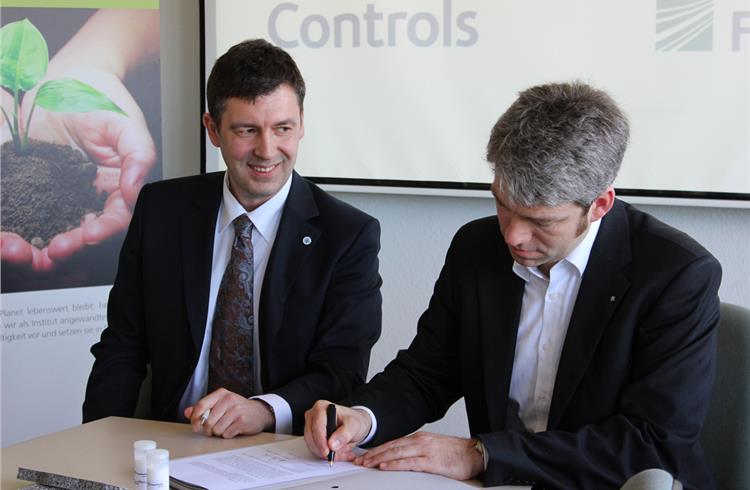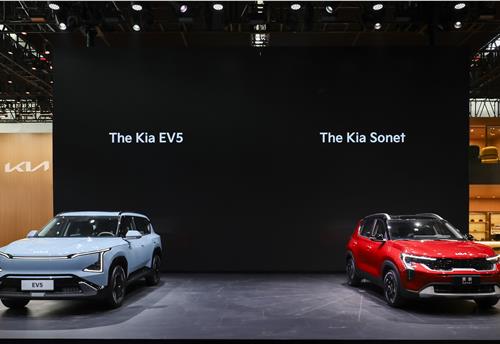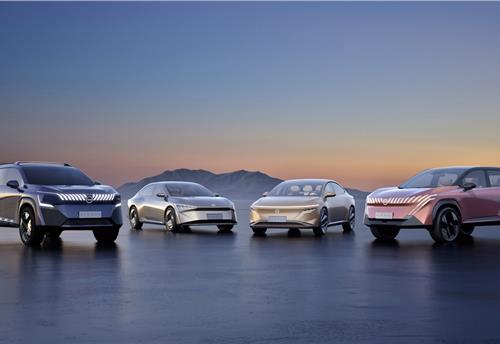Johnson Controls collaborates with Fraunhofer Institute for components to advance battery tech
Johnson Controls and Fraunhofer Gesellschaft have signed a collaboration agreement to develop the next generation of more energy efficient, cost effective cooling systems for vehicle batteries.
Johnson Controls and Fraunhofer Gesellschaft have signed a collaboration agreement to develop the next generation of more energy efficient, cost effective cooling systems for vehicle batteries. The collaboration pairs the world's leading automotive battery supplier with Europe's largest organisation for applied research.
Scientists and engineers at Johnson Controls will work with both Fraunhofer's Institute for Environmental, Safety and Energy Technology (UMSICHT) and with its Institute for Manufacturing Technology and Advanced Materials (IFAM).
The collaboration will focus on technologies and thermal management strategies for Lithium-ion battery packs. Currently, systems with fans, compressors or pumps use energy to pull heat out of a battery.
"Optimising the energy storage solution within the broader vehicle environment will enable Johnson Controls to design, develop and commercialise systems which not only meet our customers' requirements, but also lead to improvements in function, package and cost," said Mary Ann Wright, VP, Engineering and Product Development for Johnson Controls Power Solutions.
The scope of the work will initially focus on 48-Volt Micro Hybrid battery technology, which is designed to deliver strong fuel and emissions efficiency, and load management at a lower price than hybrid and electric vehicle technology.
Johnson Controls has demonstrated its advanced Micro Hybrid battery technology has the potential to reduce fuel consumption by up to 15 percent, thus helping automakers meet increasing regulations, while consumers save money when they fill their gas tank.
The technology is expected to be adopted in Europe first and then quickly move to the US, with global adoption starting in 2020.
"Our commitment to developing new battery technologies is exemplified in our strong global academic network and national lab partnerships," said Wright. "Innovative collaborations, like the one we have with the Fraunhofer Gesellschaft, are an investment in both the future of academic research in energy management, as well the development of the talent pipeline for our industry."
Along with the Fraunhofer Gesellschaft, Johnson Controls Power Solutions works with partners such as Argonne National Lab, the University of Wisconsin System, Lawrence Technological University, Ohio State University, the Milwaukee School of Engineering, HannoverUniversity, Aachen University, the University of Cambridge and the University of Science and Technology- Beijing.
Photograph: Christian Rosenkranz, VP, Johnson Controls Power Solutions Advanced Materials and Products Engineering (left) and Dr.-Ing. Christian Dötsch, Head of Energy, Fraunhofer Institute for Environmental, Safety and Energy Technology UMSICHT, sign a cooperation agreement between Johnson Controls and Fraunhofer Gesellschaft.
RELATED ARTICLES
Kia displays EV5 and Sonet SUVs for Chinese market
Kia has unveiled a number of key models and new technologies for Chinese customers at the 2024 Beijing International Aut...
Nissan targets growth in China, unveils four NEV concepts at Beijing Motor Show
The two EVs and two plug-in hybrids are a joint effort with Nissan’s local partner Dong Feng and aimed to better address...
Lamborghini unveils Urus SE ahead of Auto China 2024
Electric-only range of 60km helps reduce emissions by 80%.





 24 Mar 2014
24 Mar 2014
 2764 Views
2764 Views





 Autocar Pro News Desk
Autocar Pro News Desk




